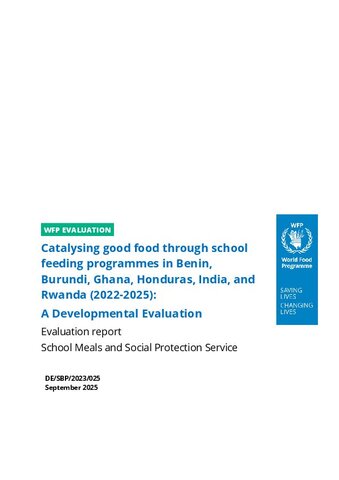
From July 2023 to April 2025, developmental evaluators worked with project implementers to collect data, make sense of findings, and drive adaptations to the projects in Benin, Burundi, Ghana, Honduras, India, and Rwanda. The final report, written by an external auxiliary evaluator, contains synthesized findings and lessons from these developmental evaluation activities.
The evaluation covered six learning areas: local economies, partnerships, sustainability, advocacy, social behaviour change communication, and gender. Evaluation questions were co-designed by the evaluation’s intended users and the developmental evaluators. The findings have contributed to project adaptations and are intended to inform future school meals projects with food systems transformation objectives.
Key findings and lessons:
- To sustainably promote nutritious commodities in school meals and the broader food system, work to address capacity gaps throughout the food value chain must continue, aided by supportive policies and effective regulation. Other markets should be developed, as respondents believed school meals alone were not enough to incentivize private sector investment.
- The projects' flexibility allowed implementers to improve the nutritional value of the school meal through means that were suited to the local context. When introducing fortified commodities at scale faced challenges in some countries, WFP pursued alternatives, such as diversifying food baskets through local procurement, while working to address barriers.
- Working with governments to generate evidence through piloting changes to the school meal and funding other research can help advocate for policy and regulatory changes.
- Growing the use of healthy foods in food systems and school meals takes time. Successful examples in the projects built on years of previous work and required collaborating with an array of stakeholders through a coordinated approach.
- Working in a complex ecosystem of partners requires careful communication to avoid duplication and requires a more coordinated way of working within WFP.
- Gender equality aspects were not systematically and adequately considered early enough in the design and implementation of projects, which negatively affected the projects’ ability to address inequalities through implementation.
The report also identified issues for consideration in future school meals and food systems projects:
- Maximize projects’ flexibility and adaptability at the country level, moving towards a ‘partner’ relationship with funders, rather than that of donor/grantee.
- Allow longer timelines for realizing results when projects are working in complex ecosystems.
- Emphasize gender equality, vulnerability, diversity and inclusion aspects earlier and more intentionally in follow-up work.
- Pursue partnerships with diverse organizations and networks like the School Meals Coalition, and pursue the idea of food systems clusters where there is interest and capacity.
- Continue to generate evidence through studies and pilot testing of new school meals approaches.
- Consider how aspects of the developmental evaluation approach can be replicated and adapted in other WFP initiatives to create opportunities for reflection and cross-country learning.
